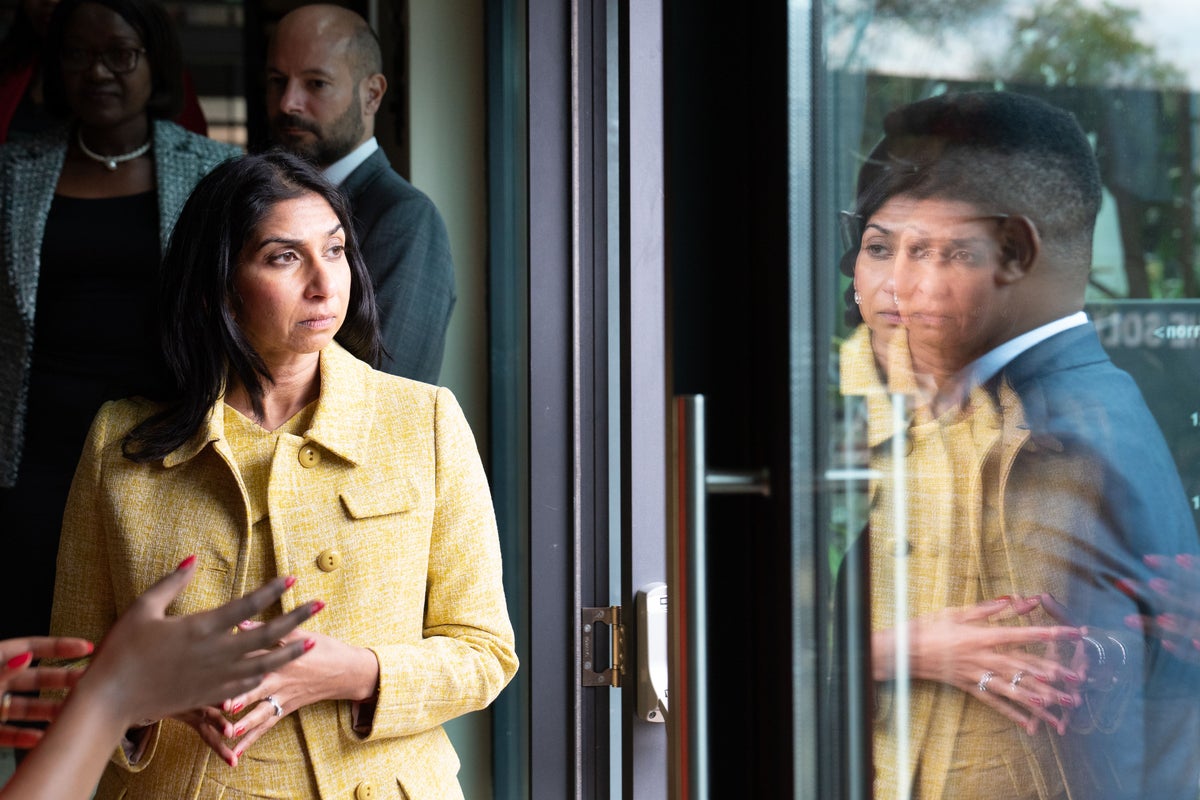
New powers that the Home Secretary wants added to the Illegal Migration Bill will not give ministers “carte blanche” to overrule European court orders, the Deputy Prime Minister has said.
Home Secretary Suella Braverman said she needs the “crucial power” of being able to stop European judges from intervening in the deportation of would-be asylum seekers who have arrived in Britain via unauthorised routes.
It comes as the Home Office confirmed a further 497 people crossed the English Channel on Saturday April 22 in 11 boats.
This brings the total so far this year to 5,546.
Oliver Dowden, the newly-appointed deputy to Prime Minister Rishi Sunak, said it was “right” for the leader of the Home Office to have discretional powers when considering interventions from the European Court of Human Rights (ECHR).
However, he said the ability for Britain to block Strasbourg judges’ rulings would not apply to all its verdicts.
I’m not saying that will give the Home Secretary carte blanche to overrule rulings— Deputy Prime Minister Oliver Dowden
Mrs Braverman has laid an amendment to the Illegal Migration Bill — legislation aimed at preventing migrants from crossing the English Channel on small boats and crushing the human trafficking trade — to allow ministers “broad discretion” to decide whether or not to accept a human rights ruling from Strasbourg.
It comes after the ECHR was able to use what is called a Rule 39 order to block the inaugural deportation flight taking asylum seekers to Rwanda last year.
Mr Dowden told Sky News’ Sophy Ridge On Sunday programme the amendments added to the legislation would give the Home Secretary the ability to consider the “timeliness” of interventions from the ECHR, particularly when it came to last-minute applications.
The senior Conservative MP said: “The Home Secretary will be given a discretion and ability to look at the circumstances of that order (Section or Rule 39) from the European Court of Human Rights and will, for example, cover factors such as the timeliness of the imposition of the order — so, for example, if it is done at last minute — and also the transparency of it.”
Pressed on whether the amendments would allow the Home Office to ignore Strasbourg rulings, Mr Dowden added: “There will be a Section 39 discretion.
“Now, I’m not saying that will give the Home Secretary carte blanche to overrule rulings.
“What I would say is that we are engaging very closely with the European court, we are making very good progress.
“I think it is right that the Home Secretary should have a discretion, so, for example, we don’t have this situation where at the very last minute an order is imposed. Those are the kind of factors the Home Secretary will be able to consider.”
The move has angered liberal-minded Tories, with Justice Select Committee chairman Sir Bob Neill announcing he was not able to support the Bill as it stands.
MPs are due to debate the controversial legislation on Wednesday as it comes back for its report stage and third reading this week.
Sir Bob told Times Radio: “I can’t support the clauses as they are drafted.
“First of all, I don’t think it’s right for us to be saying that we will ignore rules of the European Court of Human Rights, even the interim measures.”
The senior Conservative said the way Rule 39 measures operate “isn’t satisfactory” and that “judicial dialogue” was the way forward.
“I’d rather do the sensible reform, rather than get into a confrontation,” he added.
Shadow work and pensions secretary Jon Ashworth said a future Labour administration would “always follow the law” when asked whether his party thought it acceptable for European courts to overrule decisions made in the UK.
In a dual offensive by ministers, the amendments package is part of an attempt to keep both hardline Tory backbenchers and the more liberal section of MP on-side.
While the changes look to dampen a right-wing rebellion by making it harder for both domestic and international courts to intervene in deportations, ministers have also agreed to look at introducing more safe and legal routes into the country.
The UK currently has processes in place for asylum seekers from countries such as Afghanistan, Ukraine and Hong Kong to come to Britain, but human rights campaigners have urged ministers to create more routes so as to prevent desperate people from taking to dinghies to cross the Channel.
Mr Dowden said it was only after getting “control of our borders” that the UK would have “more capacity to be able to extend our kindness and generosity as a nation”.
Immigration minister Robert Jenrick said Parliament would be given a say in the routes and cap on numbers coming in.
Writing in The Sunday Express, the Home Office minister said Parliament would, as part of proposed amendments, debate the future of safe routes into the UK that are available for asylum seekers.
He said: “As we tackle the scourge of illegal migration from safe countries in this firm manner, we are increasing our already generous provisions for those directly in conflict zones by establishing an additional safe and legal route to the UK through the Bill.
“For the first time this will be informed by a consultation with local councils on their capacity to support additional people, and will be debated by your MPs in Parliament, so that we restore honesty and accountability to such an important question.”







